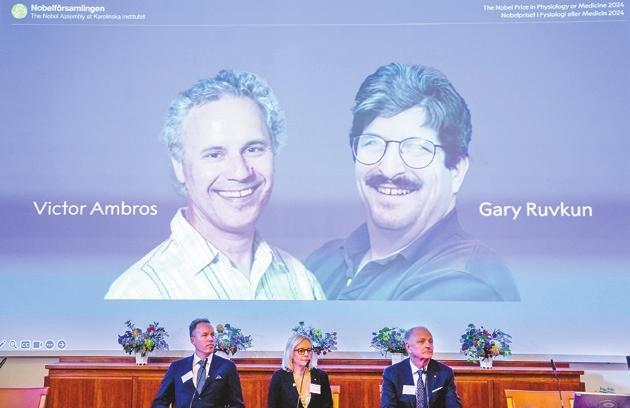
THE 2024 Nobel Prize in physiology or medicine has been awarded to U.S. scientists Victor Ambros and Gary Ruvkun for their work on the discovery of microRNA, a molecule that governs how cells in the body function. Their research revealed how genes, which contain the instruction manual for life, give rise to different types of cells within the human body, a process known as gene regulation. The Nobel Prize committee announced the prestigious honor, seen as the pinnacle of scientific achievement, in Sweden on Monday. It praised the “groundbreaking discovery,” which the committee said “revealed an entirely new dimension to gene regulation.” The discovery of gene regulation by microRNA – a family of molecules that helps cells control the sort of proteins they make that has been at work for hundreds of millions of years – was the result of decades of work by Ambros, a professor of natural science at the University of Massachusetts Medical School, and Ruvkun, a professor of genetics at Harvard Medical School. “Their discovery is of fundamental importance to understand how cells work, and thus how organisms develop,” said Love Dalén, a professor of evolutionary genomics at Stockholm University. “This finding was groundbreaking, and has affected more or less all fields of biology and medicine,” he said. “The information stored within our chromosomes can be likened to an instruction manual for all cells in our body. Every cell contains the same chromosomes, so every cell contains exactly the same set of genes and exactly the same set of instructions,” the committee said in a statement, detailing the duo’s work. Yet different cell types – such as muscle and nerve cells – have different characteristics. The two biologists have spent their careers investigating how these differences arise. “The answer lies in gene regulation, which allows each cell to select only the relevant instructions. This ensures that only the correct set of genes is active in each cell type,” the committee said. Gene regulation by microRNA has aided the evolution of increasingly complex organisms. If gene regulation goes awry, it can lead to cancer and other conditions found in humans and other animals, like hearing loss and skeletal disorders. “MicroRNAs are very much implicated in cancer. There is ongoing research to make treatments or utilize micro RNAs – mimic microRNA or block microRNA – to treat cancer. There’s some technical hurdles in that so there’s not been any drugs yet,” said Thomas Perlmann, secretary-general of the Nobel Assembly.(SD-Agencies) | 
